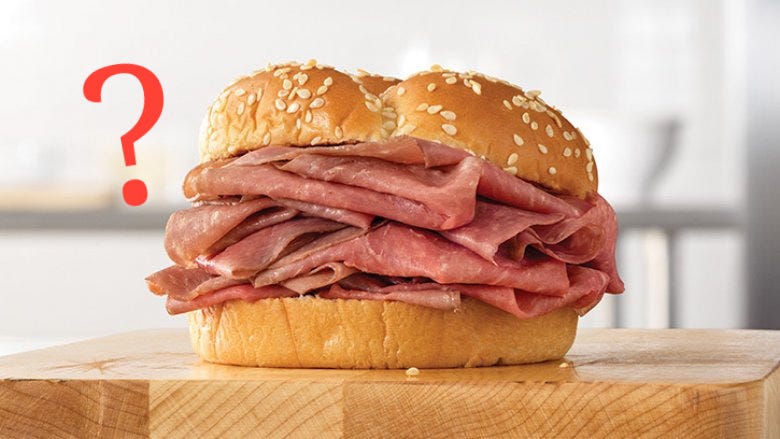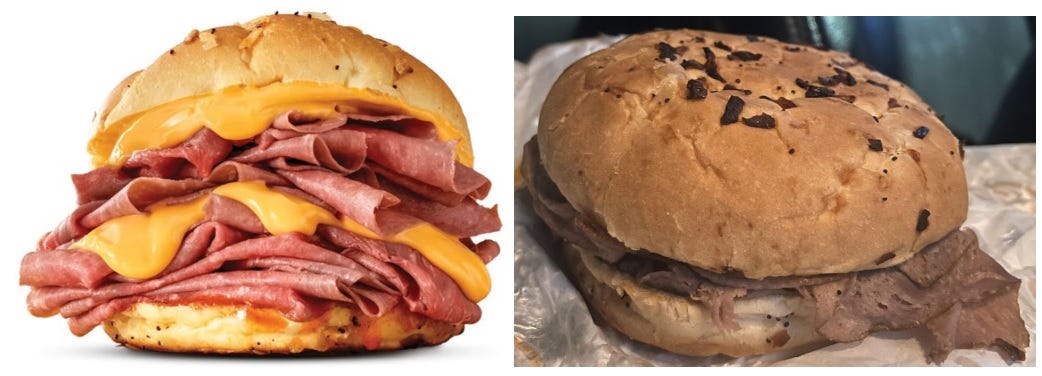Arby’s Is Being Sued for False Advertising
Arby’s false advertising lawsuit heats up in October 2025 as a federal court rejects the chain’s bid to dismiss claims that its mouthwatering sandwich images promise way more meat—and better quality—than customers actually get, sparking outrage over deceptive fast-food marketing tactics that could cost the company millions.
Arby’s, the self-proclaimed king of roast beef with its iconic “We have the meats” slogan, is staring down a class-action lawsuit that accuses the fast-food giant of straight-up lying through its lens. Filed back in September 2023 by New York customer Joseph Alongis, the suit alleges that promotional photos for fan-favorite sandwiches like the Classic Roast Beef and Double Beef ’N Cheddar make the meat piles look at least 100% bigger than reality. We’re talking stacked-high illusions created by clever staging—shoving all the beef to the front of the bun for that perfect shot—while the actual drive-thru order arrives looking more like a sad whisper of the ad. Even worse, the images supposedly flaunt rare, pink roast beef, but what hits your tray is fully cooked, grayish stuff that doesn’t match the hype.
This isn’t just a one-off gripe; it’s a systematic beef (pun intended) against how Arby’s markets across menus, apps, and delivery sites. Alongis claims he shelled out extra cash expecting a meaty feast, only to get shortchanged on both quantity and quality. The fallout? A potential payday for affected eaters and a court order to fix the fakery or ditch the “overstated” items altogether. With the case dragging into its third year, the latest twist came just last week: A U.S. District Judge in New York shot down Arby’s motion to toss the suit, ruling the photos aren’t mere “puffery”—that vague legal term for harmless hype—but concrete claims that could fool a reasonable consumer.
As fast-food inflation bites harder than ever, this Arby’s false advertising lawsuit underscores a growing consumer revolt against menu mirages. Will it force chains to dial back the photo filters, or is it all just courtroom theater? One thing’s clear: your next roast beef run might come with a side of skepticism.
Here’s the TL;DR...
The Core Complaint: Arby’s ads allegedly show sandwiches with double the meat and rarer beef than served, misleading customers into overpaying for underwhelming orders.
Key Players: Plaintiff Joseph Alongis leads the class action against Arby’s Restaurant Group Inc.; no official response from the chain beyond their failed dismissal bid.
What’s at Stake: Monetary damages for New York buyers since 2020, plus injunctive relief to revamp ads or pull menu items—could balloon if certified statewide.
Legal Lifeline: Filed under New York’s Deceptive Acts and Practices Act, the suit survived dismissal on October 3, 2025, paving the way for discovery and potential trial.
Bigger Picture: This joins a wave of fast-food suits targeting exaggerated portions, highlighting how styled shoots trick the eye amid rising prices.
Breaking Down the False Advertising Claims Against Arby’s
At the heart of this Arby’s false advertising lawsuit lies a classic bait-and-switch: visuals that scream abundance but deliver disappointment. Court docs paint a vivid picture—literally. Photos on in-store boards, the Arby’s app, and spots like Uber Eats depict sandwiches bursting with rosy, thinly sliced roast beef, artfully arranged to dominate the frame. But plaintiffs argue the real deal? A skimpy spread of well-done meat, often half the advertised volume, thanks to assembly tricks like uneven distribution or props to plump up the prototype.
Specific culprits include the Double Roast Beef (tied to value meals promising “double the meat”) and the Smokehouse Brisket, where Alongis says his August 2023 order fell flat. “Arby’s advertisements for the Overstated Menu Items are unfair and financially damaging to consumers as they are receiving a product that is materially lower in value than what is being represented,” reads the complaint, filed in the Eastern District of New York. No verified quotes from Arby’s execs have surfaced, but their dismissal push leaned hard on calling it “non-actionable puffery.” Judge Nusrat J. Choudhury wasn’t buying it, noting the images cross into factual territory by implying exact portion sizes and quality.
This isn’t smoke and mirrors without consequence. With fast-casual prices up 30% since 2020, shoppers are pickier, and regulators are circling. If certified, the class could swell to thousands of New Yorkers who’ve bitten into the discrepancy since September 5, 2020. Early estimates peg potential damages over $5 million, though settlements often water that down to coupons or small refunds.
Arby’s Isn’t Alone: A History of Fast-Food False Advertising Fiascos
Arby’s roast beef rebellion is just the latest slab in a greasy pile of lawsuits grilling food giants for menu deception. The trend exploded post-pandemic, with over 300 class actions yearly since 2021, per legal trackers like Perkins Coie. Why now? Skyrocketing costs meet savvy social media sleuths sharing side-by-side “ad vs. reality” horrors, turning viral gripes into courtroom gold.
Take Burger King, slapped in 2022 for Whoppers that allegedly pack 35% less beef than their flame-grilled fantasies suggest. Plaintiffs cried foul over photos showing patties twice as thick, with BK firing back that “reasonable consumers know” ads are styled for appeal. A Florida judge let it proceed, echoing Arby’s saga.
Then there’s Taco Bell, hit in 2023 for skimping on fillings in Crunchwrap Supremes and Mexican Pizzas. Suits claim ads overflow with beef and veggies, but orders arrive sparse—echoing Arby’s meat shortfall. Taco Bell’s defense? Handmade variations, but the case trudges on.?
Wendy’s and McDonald’s dodged bullets in 2023 when a judge tossed claims of undercooked patties in ads to fake fullness, ruling it standard industry puffery. Yet Starbucks stumbled in September 2023, facing heat for “Mango Dragonfruit” drinks with zero actual mango—just juice concentrate and sugar. “The allegations... are inaccurate and without merit,” a rep stated, but the Manhattan suit advanced.
Even candy kings aren’t safe: Hershey shelled out in 2024 over Reese’s “Peanut Butter Pumpkins” that looked more like blobs than jack-o’-lanterns. And don’t forget Kraft Heinz, sued for Velveeta mac ’n’ cheese taking longer than its “3½ minutes” promise.
These battles hinge on the “reasonable consumer” test: would a normal Joe get duped? Courts say yes when claims veer factual, no for vague boasts. For Arby’s, the denial signals trouble—discovery could unearth internal memos on photo shoots, tipping the scales.
What Happens Next in the Arby’s Meat Mess?
As October 2025 wraps, the Arby’s false advertising lawsuit barrels toward discovery, where emails and ad briefs could spill the beans. Settlement whispers? Not yet, but history shows fast-feeders often cough up lowball deals to dodge trials—think free fries over fat checks. For consumers, it’s a win for transparency: chains might rethink those Photoshop feasts.
Still, skeptics call it overreach, arguing ads are art, not contracts. Either way, next time you eye that glossy Double Roast Beef, remember: the meats might be there, but not all of ’em. Bite wisely.
Hat Tips
Allrecipes: Arby’s Is Being Sued for Allegedly Deceiving Its Customers
PRIMETIMER: Court Rejects Arby’s Motion to Dismiss False Advertising Lawsuit
BroBible: Arby’s Loses Motion to Dismiss False Advertising Lawsuit
Top Class Actions: Arby’s Class Action Alleges Advertisements Overstate Amount of Meat
CNN Business: Burgers and Tacos Don’t Look Like They Do in Ads. Lawsuits Are Trying to Change That
CBS News: Consumers Accuse Burger King and Other Major Restaurant Chains of False Advertising
NPR: Fed-Up Consumers Are Increasingly Going After Food Companies for Misleading Claims



